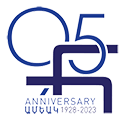
“A Selection of Western Armenian Poetry” was the title of a program held on February 25, 2025, at the Hagop Der Melkonian Hall in Lebanon under the auspices of the Hamazkayin Regional Executive Board for Lebanon and organized by the Hamazkayin “Letters and Literature” Specialized Branch. The emcees were Lilit Demirjian and Gary Conner Harboyan.
The program started with the Hamazkayin Kusan Choir performing Misag Medzarents’s “Sirerk” and Levon Shant’s “Anush.” The choir, directed by Krikor Alozian, was accompanied on the piano by Kevin Youssef.
Arman Navasardian, an actor from Armenia, recited Mushegh Ishkhan’s “Hay lezun dunn e hayun,” Madteos Zarifian’s “Yergu averagnere,” Misag Medzarents’s “Hiughe,” Bedros Turian’s “Ljag,” Zareh Khrakhuni’s “Lere,” Taniel Varoujan’s “Terenige,” and Siamanto’s “Tareru Vrezhe.”
A keynote speech was delivered by Dr. Armen Yurneshlian. He started with an overview of the history of beautiful words and their influence on people’s thoughts and spirits. He said the invention of the Armenian alphabet was a turning point for Armenian civilization and “the great inventor himself and the catholicos by his side composed the first religious songs, which as, in essence, poems.” He added that poetry continued to hold a large, worthy, and permanent place in our lives, becoming the friend of many in joy and sadness, pride and pain, the translator of our emotions and the expressor of our worries.
The speaker asserted that it is impossible to remove poetry from life because “life itself is poetry, sometimes calm, sometimes stormy, occasionally thrilling, and other times full of suffering.” Dr. Yurneshlian said that over a thousand centuries, from the first prehumans until this evening, the spoken and written word developed in topic, style, and presentation. Western Armenian poetry is part of that lineage and we will continue to enjoy it.
The audience then watched a video of Moushegh Ishkhan’s song, “Hayu hokin,” provided by the Hamazkayin Central Executive Committee. The performance was by musicians and singers from around the world. The music was composed by Armenuhi Garabedian.
As the program continued, Shoghig Torosian and Garen Kazanjian sang Misag Medzarents’s “Garmir dzaghig me karuni,” accompanied by Kevin Youssef.
At the conclusion of the program, Arman Navasartian took the stage again to recite Zahrad’s “Char paner,” Khachig Dedeyan’s “Dariner mer,” an excerpt from Levon Shant’s “Hin asdvadzner,” Moushegh Ishkhan’s “Yes Masise chdesa,” Siamanto’s “Ap me mokhir,” Vahan Tekeyan’s “Bidi iynas,” and Vahé Oshagan’s “Daretartze.”
Nayiri Atamian, on behalf of the organizers, gave a memorial gift to Arman Navasartian.
After the event, members of the audience received copies of Zahrad’s 100 Poems, published in Armenia in 2024 at the initiative of Hamazkayin and rereleased in Lebanon by the Hamazkayin Vahé Setyan Publishing House. The Lakissian family underwrote the publication in memory of Irma Kabakian-Dedeyan, a talented recited of poetry who made great contributions to the cultural life of the community.











